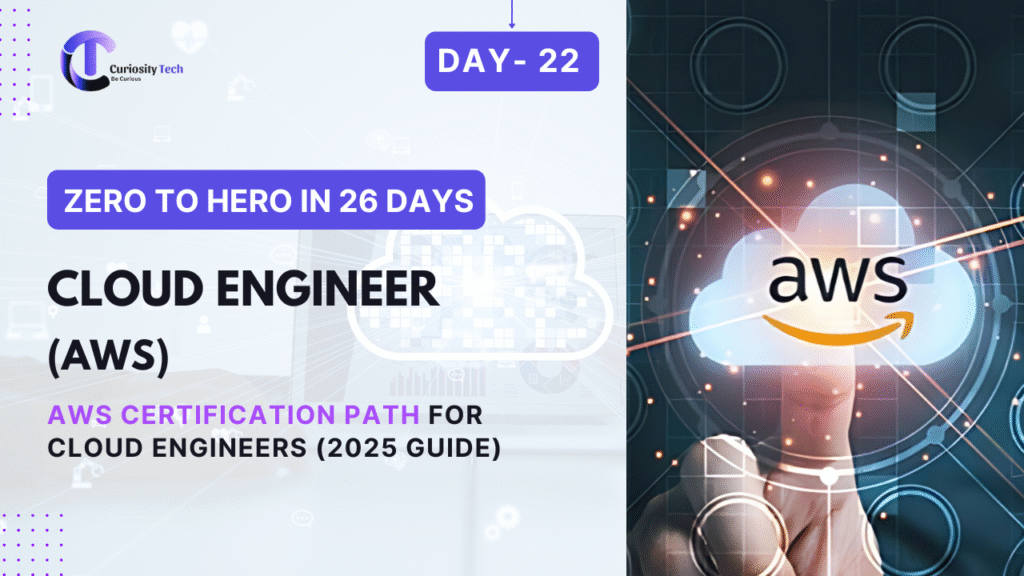On Day 22, we explore the AWS certification path, designed to validate skills, enhance credibility, and accelerate careers for cloud engineers.
At CuriosityTech.in, learners understand that AWS certifications are not just credentials—they reflect practical skills and real-world cloud expertise, helping engineers stand out in competitive roles.
1. Why AWS Certifications Matter
AWS certifications provide:
- Validation of expertise: Demonstrates understanding of AWS services and best practices
- Career advancement: Cloud engineers with certifications often earn higher salaries
- Practical knowledge: Prepares engineers to design, deploy, and operate AWS solutions effectively
- Industry recognition: Certifications are globally recognized by top organizations
CuriosityTech.in Insight: Certifications are best combined with hands-on labs, ensuring engineers can apply theory in real-world environments.
2. AWS Certification Roadmap (2025)
AWS certifications are structured across Foundational, Associate, Professional, and Specialty levels:

| Level | Certification | Skills Validated | Recommended Experience |
| Foundational | AWS Certified Cloud Practitioner | Basic AWS concepts, services, security, billing | 6 months of AWS exposure |
| Associate | AWS Certified Solutions Architect – Associate | Design and deploy AWS architectures | 1 year hands-on experience |
| AWS Certified Developer – Associate | Develop & maintain applications on AWS | 1 year experience with AWS SDKs | |
| AWS Certified SysOps Administrator – Associate | Deploy, manage, operate systems | 1 year operational experience | |
| Professional | AWS Certified Solutions Architect – Professional | Complex architecture design, scaling, migration | 2+ years of hands-on experience |
| AWS Certified DevOps Engineer – Professional | CI/CD, automation, monitoring, security | 2+ years experience | |
| Specialty | Security | Advanced security best practices | Experience in security and compliance |
| Machine Learning | Deploy ML solutions | ML & AI experience | |
| Data Analytics | Design analytics solutions | Experience in data lakes, ETL pipelines | |
| Networking | Advanced network architectures | Hands-on networking in AWS |
3. Recommended Learning Path
Step 1 – Foundational Level
- Understand AWS core services: EC2, S3, RDS, VPC
- Learn basic IAM, security, billing, and cost management
- Hands-on labs: Launch EC2, create S3 bucket, configure IAM roles
Step 2 – Associate Level
- Solutions Architect Associate:
- Design scalable, fault tolerant architectures.
- Multi-AZ and multi-region deployments.
- Developer Associate:
- Deploy Lambda, API Gateway, and DynamoDB apps
- SysOps Associate:
- Monitor with CloudWatch, CloudTrail, and automate via CloudFormation
Step 3 – Professional Level
- Solutions Architect Professional:
- Design hybrid architectures, migrations, and cost-optimized solutions
- DevOps Engineer Professional:
- Implement CI/CD pipelines, logging, monitoring, and security automation
Step 4 – Specialty Certifications
- Security: Implement encryption, IAM, KMS, and security auditing
- ML: Build, train, and deploy models using SageMaker
- Data Analytics: Use Redshift, Athena, and Kinesis
- Networking: Design advanced VPC and hybrid network architectures
4. Exam Preparation Strategy
Step 1 – Understand Exam Blueprint
- AWS provides official exam guides
- Focus on domains, weightage, and objectives
Step 2 – Hands-on Practice
- Use AWS Free Tier to create practical labs
- Simulate real-world scenarios: HA, DR, auto-scaling, security, and monitoring
Step 3 – Use Learning Resources
- CuriosityTech.in courses: Hands-on labs and detailed guides
- AWS Training & Certification Portal: Free and paid courses
- Practice exams and question banks
Step 4 – Take Notes & Revise
- Document key concepts, commands, services, and best practices
- Use diagrams for architecture patterns
Step 5 – Join Study Groups
- Forums, LinkedIn groups, and Discord communities for peer learning
- Discuss practical scenarios and troubleshooting
5. Exam Tips for Success
- Understand service limits, use cases, and integration points
- Focus on high-level architecture patterns rather than memorizing commands
- Time management: Don’t spend too long on a single question
- Read questions carefully: Watch for multi-step or scenario-based questions
- Hands-on labs are critical: Theoretical knowledge alone is insufficient
CuriosityTech.in Insight: Practical labs replicate real-world exam scenarios, reinforcing both conceptual understanding and hands-on proficiency, making learners confident for the actual exams.
6. Continuous Learning Beyond Certification
- AWS releases new services frequently → stay updated
- Follow AWS blogs, webinars, and events
- Participate in hackathons and project-based learning
- Maintain skills through AWS Free Tier labs and sandbox environments
7. Path to Expertise
- Start with Cloud Practitioner → build foundational knowledge
- Move to Associate Certifications → specialize in architecture, development, or operations
- Achieve Professional Certifications → handle complex, enterprise-grade solutions
- Choose Specialty Certifications → security, ML, data analytics, or networking
- Practice continuously → hands-on labs, real-world projects, and exam simulations
At CuriosityTech.in, learners follow this structured roadmap with personalized mentorship, practical labs, and real-time guidance, ensuring a smooth path from beginner to certified cloud engineer.
Conclusion
AWS certifications are not just about passing exams—they are a roadmap to mastering cloud engineering. By combining structured learning, hands-on labs, and real-world projects, engineers can achieve both career growth and technical excellence.
CuriosityTech.in provides industry-aligned training, practical labs, and mentorship, empowering learners to excel in AWS certifications and cloud careers.



